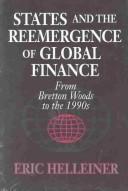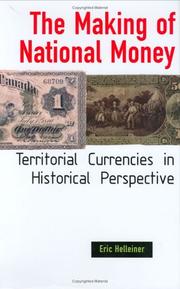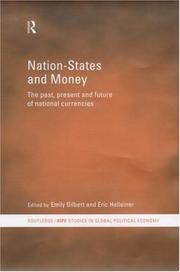| Listing 1 - 8 of 8 |
Sort by
|
Book
ISBN: 9780801452758 0801452759 1322523371 0801470617 9780801470615 9781501704376 9781322523378 Year: 2014 Publisher: Ithaca, New York : Cornell University Press,
Abstract | Keywords | Export | Availability | Bookmark
 Loading...
Loading...Choose an application
- Reference Manager
- EndNote
- RefWorks (Direct export to RefWorks)
Eric Helleiner's new book provides a powerful corrective to conventional accounts of the negotiations at Bretton Woods, New Hampshire, in 1944. These negotiations resulted in the creation of the International Monetary Fund and the World Bank-the key international financial institutions of the postwar global economic order. Critics of Bretton Woods have argued that its architects devoted little attention to international development issues or the concerns of poorer countries. On the basis of extensive historical research and access to new archival sources, Helleiner challenges these assumptions, providing a major reinterpretation that will interest all those concerned with the politics and history of the global economy, North-South relations, and international development.The Bretton Woods architects-who included many officials and analysts from poorer regions of the world-discussed innovative proposals that anticipated more contemporary debates about how to reconcile the existing liberal global economic order with the development aspirations of emerging powers such as India, China, and Brazil. Alongside the much-studied Anglo-American relationship was an overlooked but pioneering North-South dialogue. Helleiner's unconventional history brings to light not only these forgotten foundations of the Bretton Woods system but also their subsequent neglect after World War II.
International finance --- Economic development --- Development, Economic --- Economic growth --- Growth, Economic --- Economic policy --- Economics --- Statics and dynamics (Social sciences) --- Development economics --- Resource curse --- History --- United Nations Monetary and Financial Conference --- Bretton Woods Conference --- Conférence monétaire et financière des Nations Unies, --- Conferencia Monetaria Internacional de Bretton-Woods --- Conferencia Monetaria y Financiera de las Naciones Unidos --- Monetary and Financial Conference, United Nations --- Rengōkoku Tsūka Kinʼyū Kaigi --- United Nations Monetary & Financial Conference --- United nations monetary and financial conference, --- United Nations Monetary and Financial Conference. --- E-books --- Internationale financiën

ISBN: 1501701975 1501701983 9781501701986 0801428599 0801483336 9780801483332 9780801428593 Year: 1994 Publisher: Ithaca, NY : Cornell University Press,
Abstract | Keywords | Export | Availability | Bookmark
 Loading...
Loading...Choose an application
- Reference Manager
- EndNote
- RefWorks (Direct export to RefWorks)
Most accounts explain the postwar globalization of financial markets as a product of unstoppable technological and market forces. Drawing on extensive historical research, Eric Helleiner provides the first comprehensive political history of the phenomenon, one that details and explains the central role played by states in permitting and encouraging financial globalization.Helleiner begins by highlighting the commitment of advanced industrial states to a restrictive international financial order at the 1944 Bretton Woods conference and during the early postwar years. He then explains the growing political support for the globalization of financial markets after the late 1950s by analyzing five sets of episodes: the creation of the Euromarket in the 1960s, the rejection in the early 1970s of proposals to reregulate global financial markets, four aborted initiatives in the late 1970s and early 1980s to implement effective controls on financial movements, the extensive liberalization of capital controls in the 1980s, and the containment of international financial crises at three critical junctures in the 1970s and 1980s.He shows that these developments resulted from various factors, including the unique hegemonic interests of the United States and Britain in finance, a competitive deregulation dynamic, ideological shifts, and the construction of a crisis-prevention regime among leading central bankers. In his conclusion Helleiner addresses the question of why states have increasingly embraced an open, liberal international financial order in an era of considerable trade protectionism.
International finance. --- Monetary policy. --- State, The. --- Administration --- Commonwealth, The --- Sovereignty --- Political science --- Monetary management --- Economic policy --- Currency boards --- Money supply --- International monetary system --- International money --- Finance --- International economic relations --- International finance --- Monetary policy --- State, The --- bretton woods --- etat --- histoire economique --- marche international financier --- politique monetaire --- 321.2 --- 333.432.8 --- 333.600 --- 333.605 --- 336.61 --- AA / International- internationaal --- staat --- economische geschiedenis --- internationale financiele markt --- monetair beleid --- Economisch beleid van de overheid --- Internationale monetaire organisatie. Internationaal Muntfonds. Algemene leningovereenkomsten --- Financiële markten. Kapitaalmarkten (algemeenheden) --- Nieuwe financiële instrumenten --- Financieel beleid --- Histoire économique --- --Finance --- --1944-1990 --- --International finance --- --International finance.

ISBN: 1501720724 9781501720727 0801440491 9780801440496 Year: 2018 Publisher: Ithaca, NY : Cornell University Press,
Abstract | Keywords | Export | Availability | Bookmark
 Loading...
Loading...Choose an application
- Reference Manager
- EndNote
- RefWorks (Direct export to RefWorks)
Why should each country have its own exclusive currency? Eric Helleiner offers a fascinating and unique perspective on this question in his accessible history of the origins of national money. Our contemporary understandings of national currency are, Helleiner shows, surprisingly recent. Based on standardized technologies of production and extraction, territorially exclusive national currencies emerged for the first time only during the nineteenth century. This major change involved a narrow definition of legal tender and the exclusion of tokens of value issued outside the national territory. "Territorial currencies" rapidly became bound up with the rise of national markets, and money reflected basic questions of national identity and self-presentation: In what way should money be managed to serve national goals? Whose pictures should go on the banknotes? Helleiner draws out the potent implications of this largely unknown history for today's context. Territorial currencies face challenges from many monetary innovations-the creation of the euro, dollarization, the spread of local currencies, and the prospect of privately issued electronic currencies. While these challenges are dramatic, the author argues that their significance should not be overstated. Even in their short historical life, territorial currencies have never been as dominant as conventional wisdom suggests. The future of this kind of currency, Helleiner contends, depends on political struggles across the globe, struggles that echo those at the birth of national money.
Currency question. --- Money --- Money. --- Currency --- Monetary question --- Money, Primitive --- Specie --- Standard of value --- Exchange --- Finance --- Value --- Banks and banking --- Coinage --- Currency question --- Gold --- Silver --- Silver question --- Wealth --- Fiat money --- Free coinage --- Scrip --- Currency crises --- Finance, Public --- Legal tender --- Political aspects.
Book
ISBN: 9781501760136 1501760130 9781501760143 1501760149 9781501760129 1501760122 Year: 2021 Publisher: Ithaca (N.Y.) : Cornell university press,
Abstract | Keywords | Export | Availability | Bookmark
 Loading...
Loading...Choose an application
- Reference Manager
- EndNote
- RefWorks (Direct export to RefWorks)
"This book analyzes the emergence of neomercantilist thought between the late eighteenth and early twentieth centuries, highlighting the global origins of this ideology, its diverse varieties, and the lasting legacies of the ideas of its pioneers on the politics of the world economy"--
E-books --- Mercantile system --- History --- Philosophy. --- Political aspects. --- Mercantile system.
Book
ISBN: 1501760122 Year: 2022 Publisher: Ithaca : Cornell University Press,
Abstract | Keywords | Export | Availability | Bookmark
 Loading...
Loading...Choose an application
- Reference Manager
- EndNote
- RefWorks (Direct export to RefWorks)
At a time when critiques of free trade policies are gaining currency, 'The Neomercantilists' helps make sense of the protectionist turn, providing the first intellectual history of the genealogy of neomercantilism. Eric Helleiner identifies many pioneers of this ideology between the late eighteenth and early twentieth centuries who backed strategic protectionism and other forms of government economic activism to promote state wealth and power. They included not just the famous Friedrich List, but also numerous lesser-known thinkers, many of whom came from outside of the West.

ISBN: 0415189268 041551049X 0203459822 0203450930 1134658184 1280061898 0429232195 9780203450932 9786610061891 6610061890 9780415189262 9781134658183 9781134658138 1134658133 9781134658176 1134658176 9780415510493 9780203459829 9781280061899 9780429232190 Year: 1999 Volume: *2 Publisher: London : New York : Routledge,
Abstract | Keywords | Export | Availability | Bookmark
 Loading...
Loading...Choose an application
- Reference Manager
- EndNote
- RefWorks (Direct export to RefWorks)
National currencies appear to be threatened from all sides. European Union member countries are due to abandon their national currencies in favour of a supranational currency by the year 2000. Elsewhere, the use of foreign currencies within national economic spaces is on the increase, as shown by the growth of eurocurrency activity, and currency substitution in many parts of the world. In the last decade, privately-issued sub-national local currencies have also proliferated in a number of countries, and predict the emergence of private electronic monies of the future. In the light of t
Argent (monnaie) --- Geld --- Money --- Money. --- Political aspects. --- AA / International- internationaal --- 333.111.40 --- 333.400 --- 331.150 --- 333.453 --- 333.420.0 --- Gelduitgifte en gelddekking: algemeen. --- Geldwezen: algemeenheden. --- Geschiedenis van het geldwezen: algemeenheden. --- Internationale munt. Rekeneenheden. --- Theorieën in verband met de keuze van de geldstandaard. Currency substitution. Foreign currency deposits. --- Currency --- Monetary question --- Money, Primitive --- Specie --- Standard of value --- Exchange --- Finance --- Value --- Banks and banking --- Coinage --- Currency question --- Gold --- Silver --- Silver question --- Wealth --- Political aspects --- Geschiedenis van het geldwezen: algemeenheden --- Gelduitgifte en gelddekking: algemeen --- Geldwezen: algemeenheden --- Theorieën in verband met de keuze van de geldstandaard. Currency substitution. Foreign currency deposits --- Internationale munt. Rekeneenheden
Book
ISBN: 9780801448256 0801448255 9780801475610 0801475619 1322503443 0801458730 9780801458736 0801457491 9780801457494 Year: 2009 Publisher: Ithaca : Cornell University Press,
Abstract | Keywords | Export | Availability | Bookmark
 Loading...
Loading...Choose an application
- Reference Manager
- EndNote
- RefWorks (Direct export to RefWorks)
For half a century, the United States has garnered substantial political and economic benefits as a result of the dollar's de facto role as a global currency. In recent years, however, the dollar's preponderant position in world markets has come under challenge. The dollar has been more volatile than ever against foreign currencies, and various nations have switched to non-dollar instruments in their transactions. China and the Arab Gulf states continue to hold massive amounts of U.S. government obligations, in effect subsidizing U.S. current account deficits, and those holdings are a point of potential vulnerability for American policy. What is the future of the U.S. dollar as an international currency? Will predictions of its demise end up just as inaccurate as those that have accompanied major international financial crises since the early 1970's? Analysts disagree, often profoundly, in their answers to these questions. In The Future of the Dollar, leading scholars of dollar's international role bring multidisciplinary perspectives and a range of contrasting predictions to the question of the dollar's future. This timely book provides readers with a clear sense of why such disagreements exist and it outlines a variety of future scenarios and the possible political implications for the United States and the world.
US / United States of America - USA - Verenigde Staten - Etats Unis --- 333.420.0 --- 333.450 --- 333.453 --- 333.825 --- Dollar, American --- Monetary policy --- -Monetary policy --- Foreign exchange --- Currency question --- International finance --- 332.4973 --- International monetary system --- International money --- Finance --- International economic relations --- Fiat money --- Free coinage --- Monetary question --- Scrip --- Currency crises --- Finance, Public --- Legal tender --- Money --- Monetary management --- Economic policy --- Currency boards --- Money supply --- American dollar --- Cambistry --- Currency exchange --- Exchange, Foreign --- Foreign currency --- Foreign exchange problem --- Foreign money --- Forex --- FX (Finance) --- International exchange --- Theorieën in verband met de keuze van de geldstandaard. Currency substitution. Foreign currency deposits. --- Theorie van het deviezenverkeer. Theorie van de koopkrachtpariteit. --- Internationale munt. Rekeneenheden. --- Deviezenpolitiek. Interventies. --- Dollar, American. --- Monetary policy. --- Foreign exchange. --- Currency question. --- International finance. --- Electronic books. -- local. --- Monetary policy -- United States. --- Business & Economics --- E-books --- Theorieën in verband met de keuze van de geldstandaard. Currency substitution. Foreign currency deposits --- Theorie van het deviezenverkeer. Theorie van de koopkrachtpariteit --- Internationale munt. Rekeneenheden --- Deviezenpolitiek. Interventies
Book

ISBN: 3110730235 3110735164 Year: 2022 Publisher: München ; Wien : De Gruyter Oldenbourg,
Abstract | Keywords | Export | Availability | Bookmark
 Loading...
Loading...Choose an application
- Reference Manager
- EndNote
- RefWorks (Direct export to RefWorks)
What is development, what has it been in the past, and what can historians learn from studying the history of development? How has the field of the history of development evolved over time, and where should it be going in the future?
Economic development --- HISTORY / Social History. --- History --- Study and teaching. --- History. --- Development. --- Historiography. --- Development, Economic --- Economic growth --- Growth, Economic --- Economic policy --- Economics --- Statics and dynamics (Social sciences) --- Development economics --- Resource curse
| Listing 1 - 8 of 8 |
Sort by
|

 Search
Search Feedback
Feedback About
About Help
Help News
News